

Fashion in Jacobean Times. Little is known about these watercolors, which belong to a larger group held at the Folger that has been dated to the time of James I.
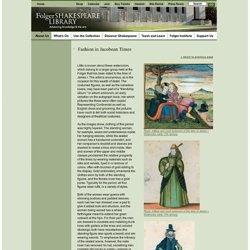
The artist is anonymous, as is the occasion for this wealth of detail. The costumed figures, as well as the nameless lovers, may have been part of a "friendship album," or album amicorum , an early variation on the autograph book, into which pictures like these were often copied. Higher Education - Education - And There's the Humor of it: Shakespeare and the Four Humors. The Changing Explanations in Mind-Body Medicine module provides teachers and students with the opportunity to discuss the implications of the exhibition “And there’s the humor of it” Shakespeare and the four humors for our understanding of how practicing physicians and medical scientists have, over a considerable period of time, typically explained disease and the factors which cause it.
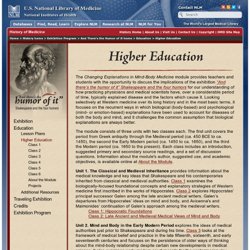
Looking selectively at Western medicine over its long history and in the most basic terms, it focuses on the recurrent ways in which biological (body-based) and psychological (mind- or emotion-based) explanations have been used to account for diseases of both the body and mind, and it challenges the common assumption that biological explanations are always better.
The module consists of three units with two classes each. Unit 1. Unit 2. Mind and Body in the Early Modern Period explores the ideas of medical authorities just prior to Shakespeare and during his time. Unit 3. High School - Lesson Plans - And There's the Humor of it: Shakespeare and the Four Humors. Grade Level: Time Needed: two 40-minute class periods.
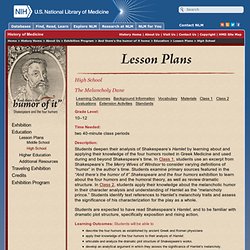
Mad Shakespeare. Interactive Globe Theatre. Good company by Paul Dean. Designing Shakespeare - Home. The web pages in this section have been created to illustrate the way in which resources from the Designing Shakespeare Project* can be used to develop a visual argument online.

The aim of this section of the Digital Resources site is to present three quite simple resources based around the following areas: King lear Hark, a vagrant: 283. #DREAM40 - Midsummer Night's Dreaming. Vizual Statistix, This is a simple scatter plot of Shakespeare’s 37... Mr. Magoo’s Cartoon Version of William Shakespeare’s Comedy, A Midsummer Night’s Dream. William Shakespeare's Star Wars eBook: Ian Doescher. Natalie Portman, Michael Fassbender Into Macbeth. Macbeth cultural References. Q. & A. with T. C. Boyle. Your story in this week’s issue, “Birnam Wood,” is set in the seventies in upstate New York, where a young couple house-sit in a picturesque lakeside area called Birnam Wood.
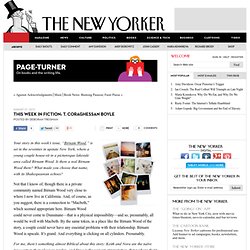
Is there a real Birnam Wood there? What made you choose that name, with its Shakespearean echoes? Not that I know of, though there is a private community named Birnam Wood very close to where I now live in California. And, of course, as you suggest, there is a connection to “Macbeth,” which seemed appropriate here. Birnam Wood could never come to Dunsinane—that is a physical impossibility—and so, presumably, all would be well with Macbeth. For me, there’s something almost Biblical about this story: Keith and Nora are the naïve innocents in their pleasure garden, and Steve is the serpent of temptation. Perhaps. The weather seems very important to this story. Macbeth Hark, a vagrant: 262. Shakespeare's smoke and mirrors tricks solved. The longstanding mystery of a floating dagger in Shakespeare's Macbeth may now have been solved thanks to the detective work of an ANU researcher.
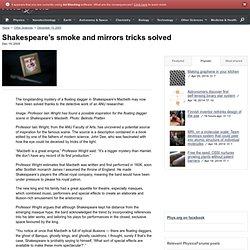
Image: Professor Iain Wright has found a possible inspiration for the floating dagger scene in Shakespeare's Macbeth. Photo: Belinda Pratten Professor Iain Wright, from the ANU Faculty of Arts, has uncovered a potential source of inspiration for the famous scene. The source is a description contained in a book edited by one of the fathers of modern science, John Dee, who was fascinated with how the eye could be deceived by tricks of the light. “Macbeth is a great enigma,” Professor Wright said.
Professor Wright estimates that Macbeth was written and first performed in 1606, soon after Scottish monarch James I assumed the throne of England. Swordfighting is Not What You Think It Is. Sword Fighting is Not What You Think...

KS3%20Drama. Shakespeare Hatred: An Underground Literary Tradition. Editor’s Note: This post first appeared on Jeet Heer’s blog Sans Everything.

Jeet graciously suggested we reprint it here as coda to our hatefest, just as a reminder that everything should be hated, not just comics. . _________________ Phrases coined by William Shakespeare. Barry Manilow may claim to write the songs, but it was William Shakespeare who coined the phrases - he contributed more phrases and sayings to the English language than any other individual, and most of them are still in daily use.
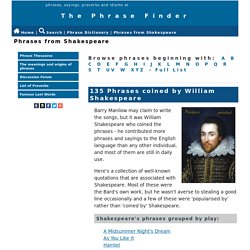
Words and Phrases Coined by Shakespeare. Words and Phrases Coined by Shakespeare NOTE: This list (including some of the errors I originally made) is found in several other places online.
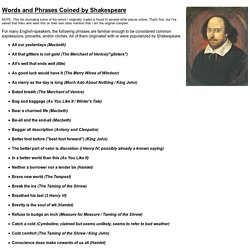
That's fine, but I've asked that folks who want this on their own sites mention that I am the original compiler. For many English-speakers, the following phrases are familiar enough to be considered common expressions, proverbs, and/or clichés. Shakespeare. How should Shakespeare really sound? Drama - Shakespeare - Macbeth - James McAvoy as Joe Macbeth. ‘Much Ado About Nothing,’ Directed by Joss Whedon. Shakespeare & Shylock by Stephen Greenblatt. Shakespeares Restless World - 2012 - Home. Life in Elizabethan England: A Compendium of Common Knowledge. John Dee. John Dee (13 July 1527 – 1608 or 1609) was a mathematician, astronomer, astrologer, occultist, imperialist[5] and adviser to Queen Elizabeth I.
He devoted much of his life to the study of alchemy, divination and Hermetic philosophy. In his lifetime Dee amassed one of the largest libraries in England. His high status as a scholar also allowed him to play a role in Elizabethan politics. He served as an occasional adviser and tutor to Elizabeth I and nurtured relationships with her ministers Francis Walsingham and William Cecil. Dee also tutored and enjoyed patronage relationships with Sir Philip Sidney, his uncle Robert Dudley, 1st Earl of Leicester, and Edward Dyer. Biography[edit] Early life[edit] Later life[edit] By the early 1580s, Dee was growing dissatisfied with his progress in learning the secrets of nature and with his own lack of influence and recognition. Final years[edit] Personal life[edit] Dee was married three times and had eight children. Achievements[edit] Thought[edit]
Tudor coroners' records give clue to 'real Ophelia' for Shakespeare. 8 June 2011Last updated at 02:00 By Sean Coughlan BBC News education correspondent. The Zombie Argument that Refuses to Die. ‘Sweetest Shakespeare fancy’s child’: The frontispiece of the First Folio We live, it seems, in a world of zombies. The economic crisis has created a host of metaphorical zombies-zombie banks, zombie companies, zombie households, all kept moving, if not exactly alive, by artificially low interest rates. The life of the mind also has its metaphorical zombies. In particular, there are zombie arguments, which can never be finally killed.
No matter how often they are — you might think — overwhelmed by evidence to the contrary, these arguments find new advocates, are reanimated, get unsteadily to their feet, and stumble groggily onwards. Approaching Shakespeare. Resource bank - Education resources. Shakespeare. National Great Books Curriculum - Research Guide to the Great Books - Shakespeare on the Web. Shakespeare on the Web Compiled by Prof. Mike Petersen Introductory/General Sites: WellesleyX: ENG112x: Shakespeare: On the Page and in Performance. Shakespeare's Sources for all dramatic and poetic works. An Awardwinning site. A Tale Full of Sound and Fury, Signifying . . . Everything?